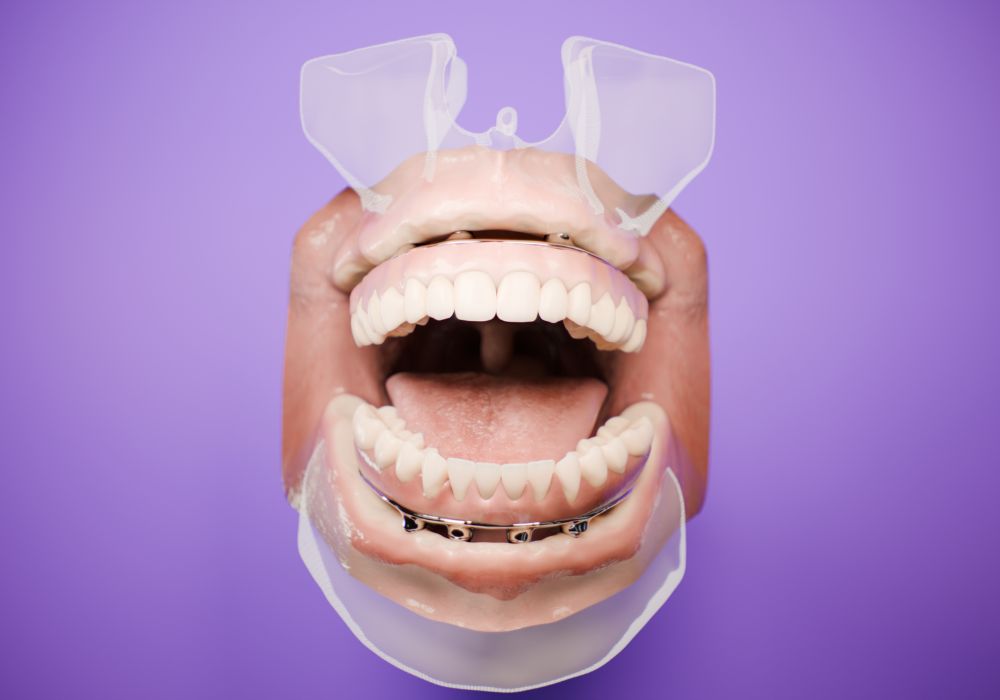Are There Any Dietary Restrictions With Full Mouth Dental Implants?
In this article, we will explore the dietary restrictions associated with full mouth dental implants, providing insights into both the initial healing phase and long-term considerations.


Research different options to find the right pediatrician
Amet mauris lectus a facilisi elementum ornare id sed sed aliquet dolor elementum magnis quisque id ultrices viverra cursus nunc odio in egestas consectetur cras consequat sodales netus pretium feugiat nulla semper senectus bibendum ornare sit adipiscing ut atid viverra donec nunc, donec pulvinar enim ac habitasse fermentum amet praesent atac elementum id sed nibh diam ultrices nibh enim volutpat varius et est sed vestibulum neque.
- Neque sodales ut etiam sit amet nisl purus non tellus orci ac auctor
- Adipiscing elit ut aliquam purus sit amet viverra suspendisse potent
- Mauris commodo quis imperdiet massa tincidunt nunc pulvinar
- Excepteur sint occaecat cupidatat non proident sunt in culpa qui officia
Check credentials and licensing
Lorem ipsum dolor sit amet, consectetur adipiscing elit, sed do eiusmod tempor incididunt ut labore et dolore magna aliqua. Ut enim ad minim veniam, quis nostrud exercitation ullamco laboris nisi ut aliquip ex ea commodo consequat.
Vitae congue eu consequat ac felis placerat vestibulum lectus mauris ultrices cursus sit amet dictum sit amet justo donec enim diam porttitor lacus luctus accumsan tortor posuere praesent tristique magna sit amet purus gravida quis blandit turpis.

Ask friends and family for recommendations
Ornare sit adipiscing ut atid viverra donec nunc, donec pulvinar enim ac habitasse fermentum amet nunc praesent atac elementum id sed nibh diam ultrices nibh enim volutpat varius et est sed vestibulum neque.
Amet mauris lectus a facilisi elementum ornare id sed sed aliquet dolor elementum magnis quisque id ultrices viverra cursus nunc odio in egestas consectetur cras consequat sodales netus pretium feugiat nulla semper senectus bibendum.
“Duis aute irure dolor in reprehenderit in voluptate velit esse cillum dolore eu fugiat nulla pariatur excepteur sint occaecat cupidatat non proident, sunt in culpa qui offi.”
Look for experience in treating your child's age
Duis aute irure dolor in reprehenderit in voluptate velit esse cillum dolore eu fugiat nulla pariatur. Excepteur sint occaecat cupidatat non proident, sunt in culpa qui officia deserunt mollit anim id est laborum.
- Neque sodales ut etiam sit amet nisl purus non tellus orci ac auctor
- Adipiscing elit ut aliquam purus sit amet viverra suspendisse potenti
- Mauris commodo quis imperdiet massa tincidunt nunc pulvinar
- Adipiscing elit ut aliquam purus sit amet viverra suspendisse potenti
Consider location and availability
Duis aute irure dolor in reprehenderit in voluptate velit esse cillum dolore eu fugiat nulla pariatur excepteur sint occaecat cupidatat non proident, sunt in culpa qui officia deserunt mollit anim id est laborum.
Lorem ipsum dolor sit amet, consectetur adipiscing elit, sed do eiusmod tempor incididunt ut labore et dolore magna aliqua. Ut enim ad minim veniam, quis nostrud exercitation ullamco laboris nisi ut aliquip ex ea commodo consequat.
Embarking on the journey of full-mouth dental implants is a transformative experience for those who have suffered from significant tooth loss. While these implants offer a promising path to restoring a functional and aesthetically pleasing smile, many patients express concerns about how this change will impact their daily lives, particularly in terms of diet. Understanding what foods you can and cannot eat after receiving dental implants is crucial not only for the recovery process but also for maintaining the longevity and effectiveness of the implants.
In this article, we will explore the dietary restrictions associated with full-mouth dental implants, providing insights into both the initial healing phase and long-term considerations. Whether you’re a prospective implant patient or have recently undergone the procedure, knowing how to adjust your eating habits is key to ensuring your new smile remains beautiful and functional for years to come. Let’s delve into what dietary changes to expect and how to best navigate them for optimal oral health.
While full-mouth dental implants are designed to mimic the strength and function of natural teeth, the longevity and effectiveness of these implants are significantly influenced by post-operative care and lifestyle choices, particularly dietary habits. Just as certain foods can impact natural teeth, they can also affect implants. Adhering to specific dietary guidelines not only aids in the healing process immediately following surgery but also helps in maintaining the structural integrity of the implants over time.
By carefully selecting foods that are implant-friendly and avoiding those that pose risks, patients can greatly extend the life of their implants and ensure their continued functionality. This proactive approach to diet can prevent complications such as implant displacement, structural damage, and undue wear, which are pivotal for sustaining a healthy, fully functional set of teeth post-implantation.
Initial Post-Surgery Dietary Adjustments
After undergoing full-mouth dental implant surgery, it is essential to adhere to specific dietary adjustments to ensure optimal healing and integration of the implants. These adjustments are categorised into two phases: the immediate post-operative period and the subsequent healing phase.
Immediate Post-Operative Period
In the days immediately following your dental implant surgery, your mouth will be healing and sensitive to pressure and irritation. To facilitate a smooth recovery and to avoid disturbing the newly placed implants:
Soft Foods and Liquids: It’s advisable to stick to a diet consisting mainly of soft foods and liquids. Options such as smoothies, soups, yogurt, applesauce, and oatmeal are excellent choices. These foods are easy on your implants and gentle on the surgical sites.
Avoidance of Hot Foods: Extremely hot foods and beverages should be avoided as they can exacerbate swelling and cause discomfort at the implant sites.
Chewing Considerations: If possible, try to chew away from the implant sites. This minimizes pressure on the new implants, allowing the area to heal without disturbance.
Healing Phase Adjustments
As your mouth heals and the implants begin to integrate with your jawbone - a process known as osseointegration - you can start to reintroduce more solid foods into your diet:
Start with softer solid foods that require minimal chewing effort, such as steamed vegetables, eggs, and soft bread. These foods help you transition back to a normal diet without applying excessive force on the implants.
Monitoring Food Texture: Continue to be mindful of the texture of foods. Gradually increase the firmness of foods as your comfort and healing progress. However, continue to avoid very hard or sticky foods during the initial weeks of healing.
Listen to Your Body: Pay attention to how your mouth feels and responds to different foods. If you experience any pain or discomfort, revert to softer options and consult your dental professional.
Important: The initial weeks after implant surgery are critical for the success of full mouth dental implants. By following these dietary recommendations, you not only contribute to effective healing but also protect your investment by ensuring the implants are well-preserved as they integrate into your jawbone. These dietary adjustments, while temporary, play a pivotal role in setting the stage for a lifetime of dental health and functionality.
Long-Term Dietary Considerations
After the initial healing phase following full-mouth dental implant surgery, patients can generally return to a more regular diet. However, even with the successful integration of implants, there are still important long-term dietary considerations to ensure the durability and functionality of the implants over time.

Foods to Be Cautious With
Hard Foods: While dental implants are robust, excessively hard foods can still pose a risk. Foods like hard candies, ice, and certain nuts should be consumed with caution. Chewing such hard substances can put undue stress on implants and potentially lead to fractures in the prosthetic components or even damage the implant itself.
Sticky and Chewy Foods: Foods that are particularly sticky or chewy, such as caramel, taffy, or even dense breads, can also pose risks. These foods might pull on the implant crowns, which could loosen them or adversely affect the bonding with the abutment.
Highly Staining Foods and Beverages: Although the materials used in making implant prosthetics are highly stain-resistant, maintaining a vibrant, white smile involves being mindful of consuming large amounts of coffee, red wine, tea, and heavily coloured foods. Regular cleaning and professional dental care help manage any discoloration that might occur.
Best Practices for Eating
Balanced Eating: Incorporate a balanced diet rich in vegetables, fruits, lean proteins, and whole grains. Such a diet not only supports overall health but also contributes to maintaining strong bones and healthy gums around the implants.
Chewing Habits: Continue to chew food evenly on both sides of your mouth. This balanced approach helps to evenly distribute the force exerted during chewing, which can extend the life of the implants and ensure even wear.
Regular Dental Check-ups: Routine visits to your dentist are essential. These check-ups allow for the monitoring of the implants and the health of the surrounding gum and bone tissue. Regular professional cleanings also help prevent plaque buildup that can lead to gum disease, which might compromise the stability of the implants.
Maintaining a careful, mindful approach to your diet is crucial even after your mouth has fully healed from implant surgery. By adhering to these long-term dietary guidelines, you can protect your dental implants, ensuring they continue to provide both functional and aesthetic benefits for many years. As always, keep in close contact with your dental care provider to tailor these recommendations to your specific health needs and lifestyle, thereby maximizing the success and longevity of your full mouth dental implants.
Foods to Encourage
For individuals with full-mouth dental implants, maintaining optimal oral and overall health involves more than just avoiding certain foods; it also includes incorporating beneficial foods into your daily diet. A nutrient-rich diet plays a critical role in supporting bone health, enhancing the longevity of the implants, and ensuring the health of the surrounding tissues.
Healthy Diet for Bone Health
Calcium-Rich Foods: Calcium is essential for bone health, which is vital for the stability of dental implants. Include a variety of calcium-rich foods in your diet such as milk, cheese, yogurt, and fortified plant milks. These help strengthen the bone structure that supports the implants.
Leafy Greens: Vegetables like kale, spinach, and broccoli are not only high in calcium but also contain a wealth of other nutrients, including vitamins A, C, and K, which are important for gum health and immune function.
Vitamin D: Vitamin D is crucial for the absorption of calcium and the health of bones. Foods rich in vitamin D include fatty fish like salmon and mackerel, egg yolks, and fortified foods. Additionally, moderate sun exposure can help boost vitamin D levels.
Phosphorus: This mineral works in tandem with calcium to enhance bone strength. Foods high in phosphorus include seeds, nuts, and whole grains.

Balanced Diet
Comprehensive Nutritional Intake: A balanced diet should include a variety of foods from all food groups: proteins, carbohydrates, fats, vitamins, and minerals. This diversity ensures that you receive all the nutrients your body needs to maintain the tissues supporting your implants and your overall health.
Fruits and Vegetables: These are high in antioxidants and other nutrients that reduce inflammation and protect against oral diseases. Antioxidants can help maintain healthy gums around the implants and reduce the risk of diseases that could compromise implant success.
Adequate Hydration: Drinking plenty of water is essential for maintaining good oral hygiene. Water helps wash away food particles and bacteria that could lead to plaque formation. It also keeps the mouth moist and supports healthy saliva production, which naturally cleanses the mouth and neutralises acid that can cause tooth decay and gum disease.
Adopting a diet rich in essential nutrients not only promotes robust bone health, which is crucial for the support and longevity of dental implants, but also enhances overall well-being. By encouraging the consumption of specific beneficial foods and stressing the importance of a balanced diet, you can significantly contribute to the long-term success of your dental implants and maintain optimal oral health.
Always consult with a healthcare provider or a nutritionist to tailor dietary choices to your specific health needs and conditions, ensuring that your eating habits support both your dental and general health goals.
Importance of Professional Guidance in Diet Planning
While understanding general dietary recommendations is crucial for maintaining the health and longevity of your full mouth dental implants, individual needs can vary based on personal health conditions, the specifics of the implant surgery, and overall lifestyle. Therefore, it is essential to seek professional advice to tailor your diet optimally for post-implant surgery recovery and maintenance.
If you’re considering full mouth dental implants, or if you’ve recently undergone implant surgery, it’s crucial to ensure that your post-operative care and diet are optimized to support your new smile. Proper care and a well-adjusted diet can significantly enhance the success and longevity of your implants.
We encourage you to reach out to our practice for a comprehensive understanding of what full mouth dental implants can offer you. 21D is ready to provide you with personalized advice tailored to your specific needs, helping you navigate the crucial aspects of post-implant care and dietary adjustments. Whether you have questions about the daily maintenance of your implants or need detailed guidance on the best foods to support your oral health, we are here to assist you.
Contact us today to schedule your consultation. Let us help you achieve and maintain a healthy, beautiful smile that lasts a lifetime. Remember, taking the right steps after your implant surgery is key to ensuring the best results, and we are committed to supporting you every step of the way.

Exploring your options or wanting to find out what we are up to? We are active on social media and regularly post educational videos as well as resources.
Not ready yet?
That’s okay, you’re not alone...
Join our Facebook Patient Group, a safe and supportive space where you can connect with others who share your questions and concerns, and hear from people who’ve already been through the journey themselves.
Who better to talk to than those who truly understand?
Book your free clinical assessment.
Start your journey to a new smile. During the assessment, you will have the opportunity to meet with one of our skilled clinicians and discuss your treatment options in detail. The assessment is free of charge, and there is no obligation to proceed with treatment. Reach out to us to take the first step towards the future you.
Not ready yet?
That’s okay, you’re not alone...
Join our Facebook Patient Group, a safe and supportive space where you can connect with others who share your questions and concerns, and hear from people who’ve already been through the journey themselves.
Who better to talk to than those who truly understand?

.png)



